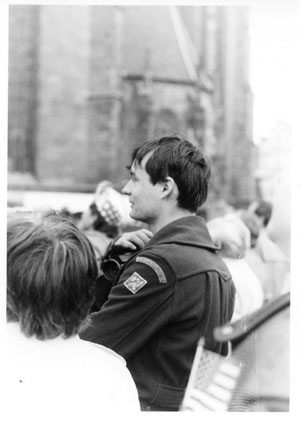Eliot Weinberger has once again listed what he has heard about Iraq—this time, what he heard in 2005. It’s a fascinating genre; it’s kind of like reading at one sitting a whole year of a laconic blog on the war. Even a news junkie may find a few things that he missed. For example, I had never heard of Bucky Bush, the uncle of the President, said to have won half a million dollars by cashing in stock options of a defense contractor, where he sat on the board of directors. And I missed the reports that the story of finding Saddam Hussein in a “spider hole” was made up.
But was it in fact made up? Maybe not. By design, Weinberger’s items are hard to sift: are they facts reported by the news media, facts neglected by them, misinformation purveyed by the government, misinformation concocted by U.S. enemies, or mere rumor? In some cases it is easy to categorize the level of Weinberger’s irony, as when he quotes Defense Department spokespeople contradicting themselves in successive press conferences. And in some cases, the undecidability seems to be his point, as when he lists the many conflicting claims about Abu Musab al-Zarqawi, and we’re left with the conclusion that it is likely to be years before we feel confident we have been told the truth about him. (Lest anyone should fear that by linking above to a government press release I have surrendered my powers of analysis, here’s a link to my favorite piece of government-authored misinformation from 2005, which happens to have been overlooked by Weinberger. On 17 January 2005, the Defense Department was so upset by one of Seymour Hersh’s New Yorker articles that they lashed out at him with a wild fabrication, accusing him of writing “an ‘alternative history’ novel.”)
At one point Weinberger writes, “I heard that the Senate, after an hour of debate, voted to deny habeas corpus protection to prisoners in Guantanamo. The last time the US suspended the right to trial was during the Civil War.” True and not true, as best I can tell. According to the Oxford Companion to the Supreme Court, “presidents invoked limited suspensions in 1871 and 1905,” and there was also a suspension in 1941, though it was ruled illegal. Perhaps it was during the Civil War that the legislative branch last suspended it; I don’t know enough to say. The specifics of the historical precedent aside, suspending habeas corpus is awfully significant, and it’s upsetting to me that there’s not a bigger outcry over it.
Habeas corpus, the writ that allows a person to challenge his arrest, derives from the Magna Carta. In 1769 Samuel Johnson called it “the single advantage which our government has over that of other countries,” and the young United States also considered it vital to liberty. Jefferson called it part of “the creed of our political faith,” and in The Federalist #84, Hamilton pointed to the Constitution’s protection of habeas corpus as evidence of that document’s respect for human rights. Its most notorious abrogation was by Lincoln, during the Civil War. At that time, a military tribunal went so far as to jail a former Congressman. (Jeffrey Rosen explicated the details with his usual fine touch in a book review for The New Republic, 10 May 2004.) In a special message to Congress, Lincoln pointed out that the Constitution allows for the suspension of habeas corpus “in cases of rebellion or invasion,” even though it doesn’t explicitly grant the power to suspend it to the President. Lincoln put his dilemma plainly: “are all the laws, but one, to go unexecuted, and the government itself go to pieces, lest that one be violated?” Lincoln didn’t expect the rights violations to last. They were unpleasant, like harsh drugs, and he didn’t “believe that a man could contract so strong an appetite for emetics during temporary illness, as to persist in feeding upon them through the remainder of his healthful life.”
In this he contrasts with the Bush administration, who, facing neither an invasion nor a rebellion, has built a brand-new, alternative judicial system, free of habeas corpus and apparently permanent, in an effort to hold indefinitely the people labeled “enemy combatants.” According to the New York Times, the Bush Justice Department will ask on Friday for federal trial judges “to dismiss more than 160 cases involving at least 300 detainees.” The issue may reach the Supreme Court, but it may not. Even if it does, it’s far from clear how the court would decide it. If habeas corpus has been successfully abolished for the detainees, then it’s a great step backward for human rights.











